 It's an old saw that it's more fun to play the villain than the good guy but I'm firmly of the mind that playing "good" is among the most challenging actorly tasks. And the virtuoso performance of pure goodness might just be...
It's an old saw that it's more fun to play the villain than the good guy but I'm firmly of the mind that playing "good" is among the most challenging actorly tasks. And the virtuoso performance of pure goodness might just be...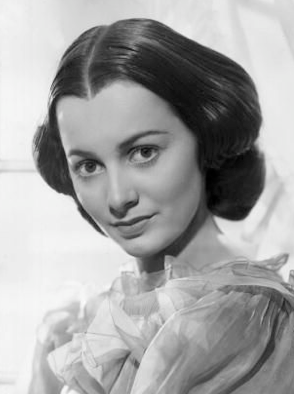
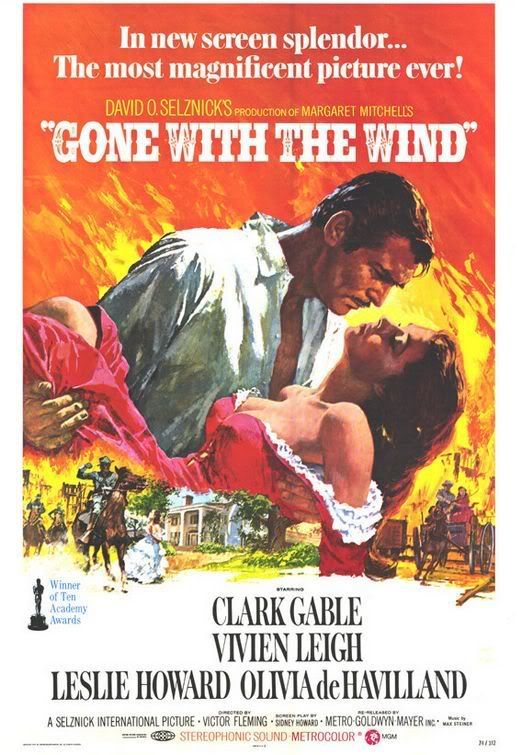
...Olivia De Haviland in Gone With the Wind (1939)
approximately 37 minutes and 46 seconds
42 scenes
roughly 16% of film's total running time
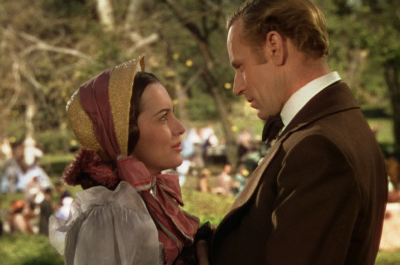 Melanie's marriage to Ashley Wilkes (Leslie Howard in a strangely flaccid performance) forever -- and perhaps unfairly -- intertwines her fate with that of Scarlett O'Hara (the legendary Vivien Leigh), who nurses a not so secret infatuation with Melanie's husband.
Melanie's marriage to Ashley Wilkes (Leslie Howard in a strangely flaccid performance) forever -- and perhaps unfairly -- intertwines her fate with that of Scarlett O'Hara (the legendary Vivien Leigh), who nurses a not so secret infatuation with Melanie's husband.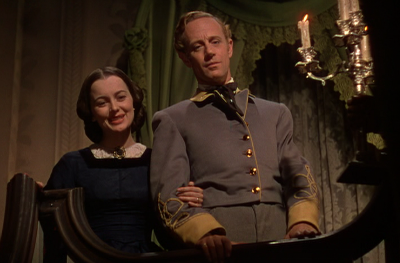 Melanie's kind decency remains unbent by war or by Scarlett and De Haviland invests the character with such a preternatural goodness that sunshine and rainbows seem nearly to emanate from Melanie's beaming face.
Melanie's kind decency remains unbent by war or by Scarlett and De Haviland invests the character with such a preternatural goodness that sunshine and rainbows seem nearly to emanate from Melanie's beaming face.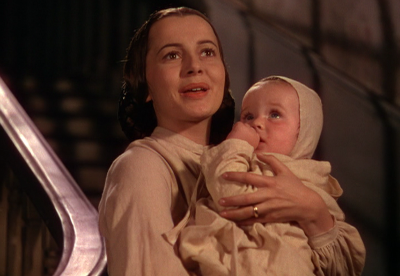 Because her Melanie is so unstintingly, so impossibly, so insufferably good, De Haviland's performance might be easily dismissed for lack of depth, complexity or dimension. To do so, however, would be a mistake.
Because her Melanie is so unstintingly, so impossibly, so insufferably good, De Haviland's performance might be easily dismissed for lack of depth, complexity or dimension. To do so, however, would be a mistake.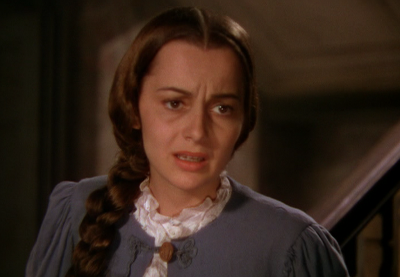 De Haviland's characterization appears to be based upon one of Gone With the Wind's fundamental moral lessons: that one has the choice to embrace one's fate with a loving zeal (as De Haviland's Melanie does) or to fearfully fight it with every tooth and nail (like Leigh's Scarlett). Put another way, Scarlett's likely to complain about the lemons while Melanie's off making the lemonade. To her credit, De Haviland appreciates the simplicity of this dramaturgical opposition between her character and that of Scarlett and she makes a good bit of lemonade from the thinly scripted role of the saintly Melanie.
De Haviland's characterization appears to be based upon one of Gone With the Wind's fundamental moral lessons: that one has the choice to embrace one's fate with a loving zeal (as De Haviland's Melanie does) or to fearfully fight it with every tooth and nail (like Leigh's Scarlett). Put another way, Scarlett's likely to complain about the lemons while Melanie's off making the lemonade. To her credit, De Haviland appreciates the simplicity of this dramaturgical opposition between her character and that of Scarlett and she makes a good bit of lemonade from the thinly scripted role of the saintly Melanie.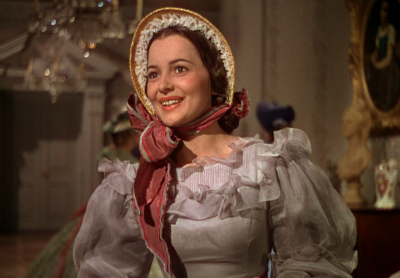 From the outset, De Haviland's Melanie is more formidable than she appears. Intent on maintaining peace with her ostensible rival (remember that Melanie knows that Ashley's heart belongs to her, not Scarlett, from the film's beginning), De Haviland also lays the foundation for a future relationship with Scarlett, a relationship that proves one of the film's most central and most interesting.
From the outset, De Haviland's Melanie is more formidable than she appears. Intent on maintaining peace with her ostensible rival (remember that Melanie knows that Ashley's heart belongs to her, not Scarlett, from the film's beginning), De Haviland also lays the foundation for a future relationship with Scarlett, a relationship that proves one of the film's most central and most interesting.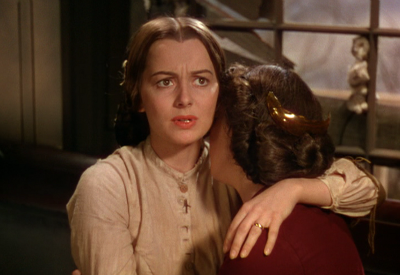 As she does, De Haviland's Melanie develops an astute appreciation, even admiration, of Scarlett. While Mammy and Rhett see through each of Scarlett's petty deceits (and can't help but to love her anyway), De Haviland's Melanie is perhaps the single character to see everything that's true and good about Scarlett. Indeed, by the film's end, Melanie is the character who knows Scarlett better than anyone, even Rhett, and it's because of De Haviland's slow and steady work in the role that Melanie's insights maintain their humanity (when a lesser actress might have just as easily spun them as divinely inspired beatitudes).
As she does, De Haviland's Melanie develops an astute appreciation, even admiration, of Scarlett. While Mammy and Rhett see through each of Scarlett's petty deceits (and can't help but to love her anyway), De Haviland's Melanie is perhaps the single character to see everything that's true and good about Scarlett. Indeed, by the film's end, Melanie is the character who knows Scarlett better than anyone, even Rhett, and it's because of De Haviland's slow and steady work in the role that Melanie's insights maintain their humanity (when a lesser actress might have just as easily spun them as divinely inspired beatitudes).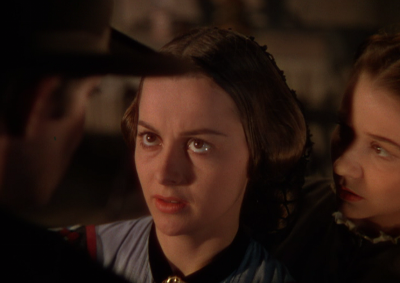 Along the way, and with Scarlett and Rhett as her primary tutors, Melanie accrues a steady worldliness which De Haviland exploits to deepen the character's unshakeable integrity. When Melanie acts "out of character" -- as when she celebrate's Scarlett's murder of the Yankee deserter, or as when she befriends Belle Whatling, or as when she welcomes Scarlett to her husband's birthday party -- De Haviland's approach emphasizes the continuity (rather than incongruity) of Melanie's choices.
Along the way, and with Scarlett and Rhett as her primary tutors, Melanie accrues a steady worldliness which De Haviland exploits to deepen the character's unshakeable integrity. When Melanie acts "out of character" -- as when she celebrate's Scarlett's murder of the Yankee deserter, or as when she befriends Belle Whatling, or as when she welcomes Scarlett to her husband's birthday party -- De Haviland's approach emphasizes the continuity (rather than incongruity) of Melanie's choices.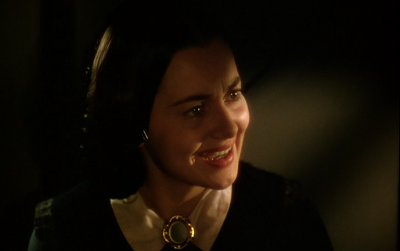 Indeed, what I think I admire most about De Haviland's approach to the role is that she permits Melanie to grow and to learn without making a show of how she's changed. De Haviland, instead, opts to take what is both a more challenging and risky approach to Melanie. By the end of the film, De Haviland crafts a character who has developed and deepened even though she remains essentially the same person as she was when we met her.
Indeed, what I think I admire most about De Haviland's approach to the role is that she permits Melanie to grow and to learn without making a show of how she's changed. De Haviland, instead, opts to take what is both a more challenging and risky approach to Melanie. By the end of the film, De Haviland crafts a character who has developed and deepened even though she remains essentially the same person as she was when we met her.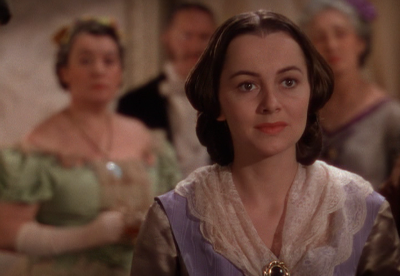 And the narrative requires this continuity from Melanie. She must remain good, for she -- not Scarlett -- embodies the ideal of Southern womanhood upon which every confederate romance must depend. Yet, through De Haviland's meticulously human performance, her Melanie becomes more than a symbol and emerges as the embodiment of Gone With the Wind's emotional heart.
And the narrative requires this continuity from Melanie. She must remain good, for she -- not Scarlett -- embodies the ideal of Southern womanhood upon which every confederate romance must depend. Yet, through De Haviland's meticulously human performance, her Melanie becomes more than a symbol and emerges as the embodiment of Gone With the Wind's emotional heart.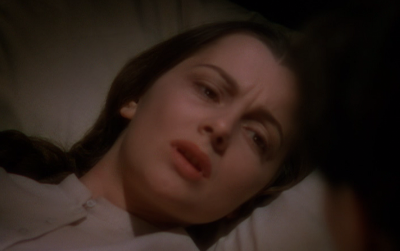 In a role that would be hard to get wrong, De Haviland gets things right with a complexity and humanity that exceeds the narrative expectations of the role.
In a role that would be hard to get wrong, De Haviland gets things right with a complexity and humanity that exceeds the narrative expectations of the role.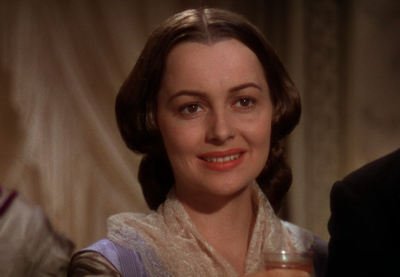 Admirable actressing made all the more interesting for how good De Haviland is at playing "good."
Admirable actressing made all the more interesting for how good De Haviland is at playing "good."
4 comments:
How wonderful that someone else appreciates the brilliance of this performance! I hope the others agree with us...
I've always liked De Haviland's performance more than McDonald's who - unfortunately - I felt gave a performance that was the victim of the time the film was made.
I , too, appreciate Olivia de Havilland's finely tuned performance. It is deeply moving because of the consistency of character shown throughout the film. It also helps that de Havilland casts a luminous glow even in the films darker moments. Lovely discussion.
Post a Comment